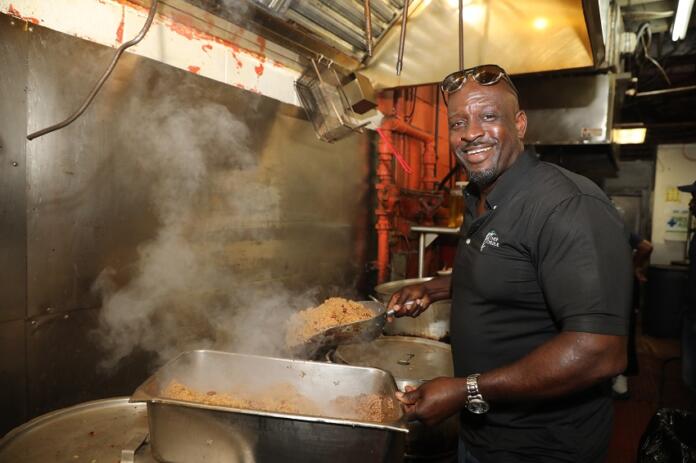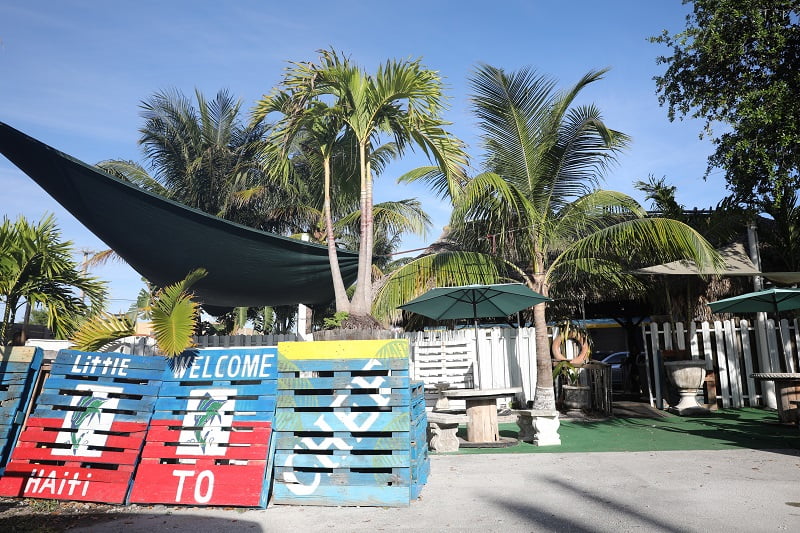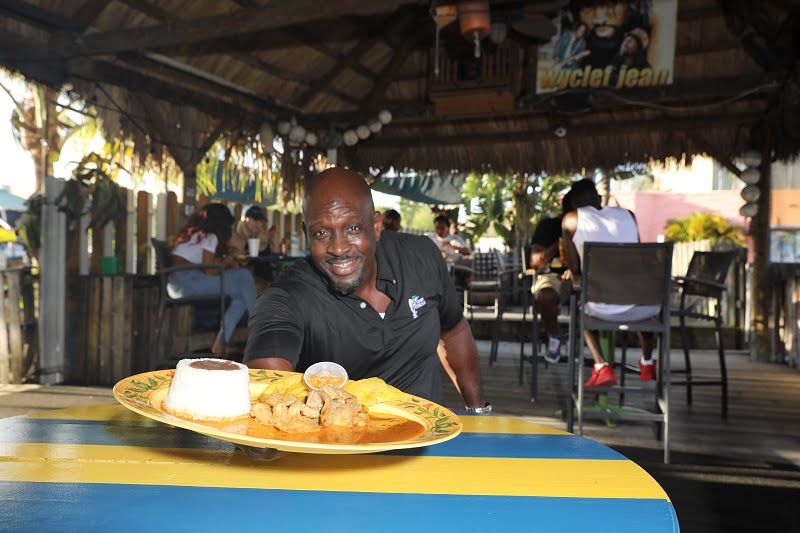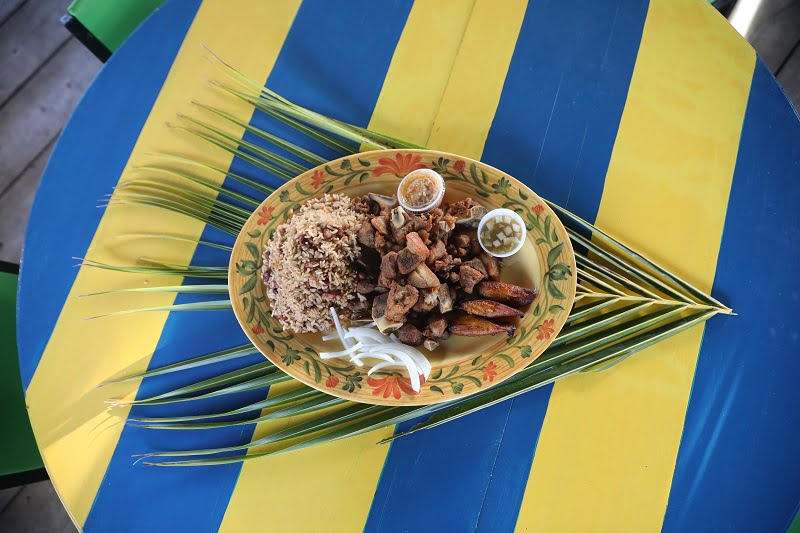
Island Origins Director of Business Development Tamara Philippeaux recently had a chat with her old friend, celebrity chef and serial entrepreneur Ken Sejour, the restaurateur behind the Chef Creole brand. For almost 30 years, Chef Creole has been satisfying foodies across the cultural spectrum as the king of Caribbean fusion cuisine, all while being a model for responsible citizenship. Island Origins had the chance to listen in while they caught up.
Tamara: So Chef, how did you actually get started in this business?
Ken: We started December 5, 1992. The concept was to display seafood so “you buy, we fry.” We’d show you a big display of seafood and charge according to the weight. The concept took off like a jet.
Our people are very economical. So if something costs $10 and they can get it for $7, they’re gonna get it for $7. Other communities received Chef Creole because we got a little creative. Carmen Hope at WEDR told me, “You need to invite another demographic. Your food is good. It should be good for everyone.” At the end of the commercial [I ran with them], they told everyone to try the fried fish. Oh my God, was she right! I went from selling, let’s say, 50 fried fishes in a day to, like, 250.
When people came in, they didn’t question the prices. They said, “Is that the same fish I got yesterday? Yeah? Give me five of them.”
Tamara: Nice! And what would you say was a time that challenged you like you hadn’t been challenged before?
Ken: There was an opportunity to buy 54th Street, which would have been our third restaurant. Everyone said it was a bad idea because the Haitians are on the north side of 54th and we were looking on the south side. But what they didn’t know was that my intention was to go after a Black-American crowd. When we opened it up, of course we had growing pains. I even closed the restaurant down and took off on vacation for 14 days to clear my head. But I came back, it took about a year, and ever since, it’s been like a jet.

Tamara: So you’ve always been innovative, but what would you say is the “secret sauce” that makes Chef Creole’s Caribbean fusion cuisine so successful?
Ken: I’m Bahamian and Haitian. When you take [Bahamian] conch salad or fried conch and you cross it over, now you’ve got a bigger market you are catering to. [Haitian] creole food is, of course, traditional legume, griot, tasso. So we took fried conch and we “creole-fied” it. Nou manje queu boeuf but oxtail is popular because of Jamaicans — we “creole-fied” it. So when other nationalities came in, they identified their food and the flavor that we gave them. That’s what made the difference.
Tamara: You’ve seen phenomenal growth over the years. You now have six locations throughout Miami, including one at Miami International Airport — congrats on that. That’s not based only on the Caribbean fusion cuisine that goes into the pot. Is there some kind of guiding principle behind the way you’ve grown?
Ken: When we first started, we sponsored everything. The Haitian community at that time was into foutbòl and [for the championship team], we had our names on the shirt. That was our first date with giving, and you saw the impact that had on the community. When people got familiar with always seeing us sponsoring, they started to come to us with their concerns. When you saw the impact you had on just one person [when you gave them] help, you saw the world change in their eyes.
From that point, it always stood out to me that success is not just taking or receiving, success is also giving. If you’re able to make a profit, and from that profit you are able to give back, that in itself is a profit. It’s a practice that we embedded in the brand. That’s just the way we do business.

Tamara: I know this. I’ve seen how much you give back to the community and how you’ve changed people’s lives. And the whole country saw that philanthropic spirit in action when the news was covering you feeding the TSA workers at MIA for free when the airport was shut down.
Ken: Yeah, I think we were there [with a new Chef Creole location] no more than maybe four or five months. [I thought] — we’ve got inventory, we might as well do some good with it. I didn’t start it to say that I was going to keep feeding people. I started it because the Holy Spirit put it in my heart.
I’m thinking I opened up a can of worms. But the next day I got phone calls from suppliers that said, “Hey, we like what you’re doing. How can we help?” I say, “Give me a couple cases of chicken.” They said, “We’ll do better than that. We’ll drop a hundred cases off to you.”
So I went from feeding 200 people, then it was 200 people a shift, and we ended up feeding people for a month. I was the one that said no, no more. Although I had the support, although they kept giving me food, it was exhausting.
I started something. Everyone that’s been here before me should now say to themselves, “Let’s take the baton from him,” and that’s exactly what they did.

Tamara: Where do you see yourself going in the future?
Ken: In the next 10 years, I would hope that I become a vehicle to continue employing people, because at the end of the day, I think the best thing you can do for someone is give them a chance to work and make money. That way they can build up their self-esteem. Making money is freedom.
I would hope that we’re blessed enough that maybe we could start building affordable housing units. That way we could keep our people safe. Little Haiti, for me, is a very sensitive issue because of what’s going on right now with gentrification. It’s heartbreaking. I see that little by little it’s dwindling away, and it’s being done in such a creative and constructive manner that when it’s all said and done, people wouldn’t even know that there were Haitian people in this area in the first place.
2020 was a time where I did a lot of reflection. I looked at my family. I looked at the employees. I said, “I’m tired. I want to rest. I want to take advantage of all the work that I’ve done.” There was a voice inside of me that said, “Stop working hard, work smart. You’re going to have to open up at least a thousand stores.” And I asked myself, “How am I going to do that?” And then myself told me to figure it out — so I have to figure it out!
So this year we will be selling franchises. That’s the best that I can do. We will be in Broward, South Miami and then Orlando.
Tamara: I’m really proud of you. The whole Haitian community is.
Ken: Thank you for being proud of me. You should be more proud of my wife! Siw m pat gin on bon fanm bo kotewm, mwen tap tet anba. (If I didn’t have a good woman by my side, I would be upside down.)
If I was worth a hundred million dollars and tomorrow they said, “Look, you’ve got to make a choice. Out of the hundred million dollars, we’ll leave you with $1 million and your wife, or we could find you another woman that is just as good as your wife and we’ll give you $99 million,” I would say leave me with a half a million and my wife. Take the half a million dollars just for closing the deal.
Your successes as a businessman, as a man on this planet, is your woman. Not any woman. The woman that God chooses for you. Not the woman you choose, ’cause you don’t know what the hell you’re doing.
Learn more about Chef Ken Sejour and Chef Creole restaurants offering Caribbean fusion cuisine at chefcreole.com.






























